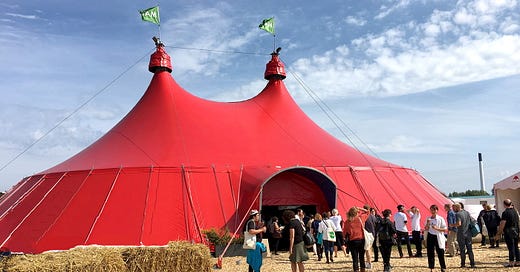MAD 7 happened over the weekend in Copenhagen. I didn’t go, though I did go to MAD 5 in 2016, and penned the story below afterwards. I’m posting it here again because, after reading it 9 years later, I was surprised at how relevant the text remains. The same concerns keep coming up. A broken food system. Poor mental health for restaurant workers. A need for more kindness and awareness. It’s not like those problems would go away this quickly. We had a pandemic in between. Donald Trump was elected U.S. president. Twice. There was #MeToo and Mario Batali. Gaza. I think, if anything, the idea of this symposium, continues to be that we need each other. Yet, the same question remains: what will come of it? Will attendees reflect on what they heard? Will the relationships they built go somewhere? Will they put these ideas to action? Can they apply them to a wider audience that extends beyond a small tent, a tiny gastronomic bubble? I hope so.
I’m late for dinner. My plane arrived in Copenhagen from Moscow without my bag, so after sorting things out with the airline I take an Uber straight to the restaurant. The driver doesn’t recognize the location, as 108, a Noma spinoff, is still quite new. I tell him I’m food writer and he asks if I am in town for MAD, which is being held in a circus tent on the Refshaleøen waterfront in a few days. He is well aware what it is and what Noma is. There might not be any other city in the world where even the taxi drivers are as knowledgeable about the city’s fine dining scene as Copenhagen.
He is Turkish, but has lived in Copenhagen for a few years. “How good could a meal be that costs 500 euros?” he asks. Before I can answer he goes on. “You know, the other day my wife made something that was so good. I couldn’t believe it. She’s not a chef or anything. It was just something at home. She just changed one thing. I was like ‘what did you do?’ But it was so delicious.” He was smiling and almost in tears thinking about how good this meal was. “I think about Noma and I ask myself how much tastier could a restaurant like that be?”
“Well, it’s not, really.” I try to explain. “But there’s more to it than that.”
MAD 5, Tomorrow’s Kitchen, opens with Jacques Pépin. The lights are dimmed. It’s quiet. He begins to talk as he breaks down a chicken and talks. When he grew up home was a restaurant he says. His mother did everything from scratch. Everything was local and organic because that’s the way it was. He taps the leg bone with the knife and it just slides out. The crowd roars.
“First learn to be a craftsman,” he says. “Repeat and repeat. If you are a good craftsman, you can run a restaurant. Only then you can express yourself. If you have taste, talent, a bit of vision. But you need to repeat those techniques enough so you can afford to forget them.”
This is how MAD begins every year. Tatsuru Rai of Japan’s Sobatei Rakuichi started MAD 4 making soba noodles, while Tuscan butcher Dario Cecchini opened MAD 3 cutting open a pig while Metallica played overhead. So the lesson is, before everything else, be a cook. A good cook.
Another theme that ran throughout MAD 5 was health. The kitchen can be a brutal, crappy place at times and many cooks burn out. They don’t take care of their physical or mental well being. They turn their backs on their personal lives. They turn to drugs and alcohol.
René Redzepi suggests on the main stage in trying to do the things you can. The new Noma will have a 4-day work week and gym access. “It can still be an unforgiving place and I can still be the biggest dick in a kitchen,” he says.
“We’re not taking care of ourselves or each other. Work takes a toll. It can make you a mess outside the kitchen,” says journalist Kat Kinsman, in her keynote “What’s Killing the Restaurant Industry.” She speaks of how 84 percent of cooks suffer from depression. How alcoholism is rampant but most cooks are afraid to tell anyone for fear of being seen of as weak. How a former Manresa chef succeeded in the workplace, yet it took a toll on the rest of her life.
Mexico’s Jaīs Tellez and Rafael Magaña found a solution in making their restaurant Laja like a family.
So two lessons right away: be a good cook and stay healthy, without those two things you can forget about changing the world.
Keep reading with a 7-day free trial
Subscribe to New Worlder to keep reading this post and get 7 days of free access to the full post archives.




